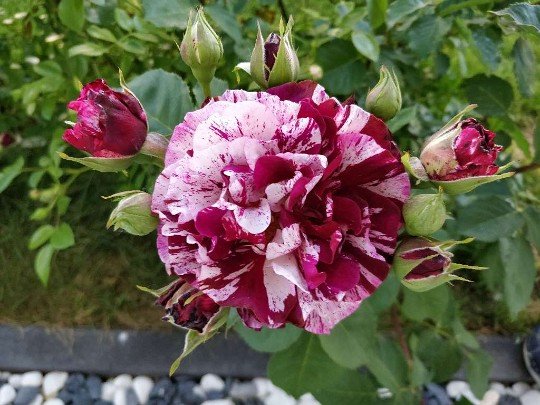Jetzt ist die richtige Zeit die Rosen zu düngen. Um das Wachstum und den Blütenreichtum zu fördern, sollten Sie jetzt einen stickstoff- und phosphorreichen Dünger verwenden. Wichtig ist auch, dass der verwendete Dünger über zahlreiche Spurenelemente verfügt. Sehr gut und günstig ist der Dünger Oscorna Animalin (Hornmehl). Für die Düngung der Rosen in Kübeln, Töpfen und anderen Gefäßen empfehlen wir unseren Osmocote Langzeitdünger.

Herzlich willkommen in unserem Onlineshop für Rosen, Zubehör und Begleitpflanzen. Ab jetzt können Sie noch komfortabler als bisher durch unser breites Rosensortiment streifen und mit der erweiterten Suche sehr schnell Ihre favorisierten Pflanzen ausfindig machen.
In der Kategorie Gartenrosen finden Sie unsere wurzelnackten Buschrosen. Diese Rosen können Sie von Oktober bis April online bestellen und in Ihrem Garten pflanzen. Damit Sie sich in unserer großen Auswahl von über 1800 Rosensorten zurecht finden ist unser Sortiment in Moderne- und Historische Rosen aufgeteilt, denen die einzelnen Rosenklassen untergeordnet sind. Zusätzlich sind unsere Rosenpflanzen nach Ihren Eigenschaften gruppiert, um z.B. schnell Rosen mit Duft, ADR-Rosen oder bestimmte Farben (Edelrosen in rot, rosa Kletterrosen, etc.) zu finden. Natürlich lassen sich die Pflanzen auch nach Ihren Rosenzüchtern gruppieren.
Bei den Stammrosen sind sowohl wurzelnackte Rosen als auch Containerrosen zusammengefasst und beinhalten alle Stammhöhen von Zwergstammrosen bis Trauerstammrosen. Wie bei den Gartenrosen gibt es vordefinierte Unterkategorien, um sich schnell zurecht zu finden.
Unsere Containerrosen können das ganze Jahr über bestellt werden und sind nach den diversen Topfgrößen gruppiert. Vom kleinen 3-Liter Container bis zur großen Präsentrose im 8-Liter Topf finden Sie hier eine reichhaltige Auswahl für Ihre Terrasse, Ihren Balkon oder Garten. Egal ob Edelrose, Kletterrose oder Bodendecker, ab Mai gibt es die ersten Pflanzen mit Blüten zum günstigen Preis.
Zu einem schönen Garten gehören selbstverständlich auch Begleitpflanzen und Accessoires. Eine sehr große Auswahl an Stauden und Flieder runden hier unser Auswahl ab. Damit Rosen und die anderen Pflanzen die besten Voraussetzungen bekommen, dürfen natürlich Dünge- und Pflanzenschutzmittel nicht fehlen.
Rosen online kaufen leicht gemacht beim Rosen Fachmann!
Immer bestens informiert über Angebote, Schnäppchen & Pflegetipps mit unserem kostenlosen Newsletter